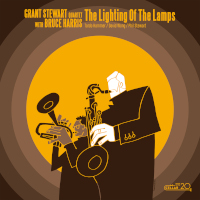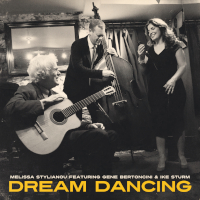I get a lot of music for my consideration, already 350 (!) new releases so far this year. Almost all of them are notable for something, and I’d like to give them their due. So, when I’m not previewing live events in Northeast Ohio, I’ll offer hot takes on the preceding week’s releases. Like these.
 Portland is known for rain, artisanal coffee and thanks to Fred Armisen and Carrie Brownstein, as the apotheosis of farm-to-table Millennial pretentiousness.
Portland is known for rain, artisanal coffee and thanks to Fred Armisen and Carrie Brownstein, as the apotheosis of farm-to-table Millennial pretentiousness.
It also seems to be home to some extraordinarily accomplished musicians. Dmitri Matheny is one of them, and on Cascadia (Origin Records) he seems intent to show that in terms of polish and taste, the City of Roses yields nothing to the Big Apple. I’m put in mind of the impeccably produced CTI small-group recordings by Ron Carter, Milt Jackson and Paul Desmond. Matheny plays flugelhorn and was a protégé of Art Farmer, himself a CTI artist for a minute. Like his mentor, Matheny likes his music orderly, mellow and emotionally modulated. Every note seems placed with the precision of a microgreen lovingly tweezed onto a salmon steak—just so–by a chef in a PNY bistro. When a moment of darkness arrives, as it does on the emotionally turbulent “Bourdain,” it startles. That’s an anomaly; elsewhere, “Cascadia” is jazz that goes down as easy as a Willamette Valley pinot noir.
 At the other extreme, there’s “Sunburst,” the opening cut on Points of View (Left Angle Records) by Bill Ortiz. Powered by veteran drum bigfoot Dennis Chambers, it’s 8:33 of jacked backbeat funk, a harder-edged update of Eddie Henderson’s 1975 fusion banger with the leader’s trumpet, Harmon-muted and open, soaring over the simple vamp. There’s nothing tricky or subtle about it, and it’s devastatingly effective, especially in a mix that could be designed with the dance floor in mind. Could this be the music Miles Davis heard in his head when he emerged from retirement? A native of the Bay Area who spent 16 years with Santana, Ortiz has high-level credits in R&B and Latin music . From the former comes his allegiance to lean rhythm sections pumping out big beats, from the latter genre a clear, focused tone that moves powerfully in the upper register. It’s an effective combination. Fold in Azar Lawrence’s tenor and 10 attractive compositions—some bugalú, some Afro-Cuban mystery (Jaco Pastorius’ “Okónkole y Trompa”) and an out-of-left-field ringer (“My Lord and Master” from “The King and I” done as a lush bolero) and you have an unexpected winner. But go back and listen to “Sunburst” again. It’s great summer music and it slaps.
At the other extreme, there’s “Sunburst,” the opening cut on Points of View (Left Angle Records) by Bill Ortiz. Powered by veteran drum bigfoot Dennis Chambers, it’s 8:33 of jacked backbeat funk, a harder-edged update of Eddie Henderson’s 1975 fusion banger with the leader’s trumpet, Harmon-muted and open, soaring over the simple vamp. There’s nothing tricky or subtle about it, and it’s devastatingly effective, especially in a mix that could be designed with the dance floor in mind. Could this be the music Miles Davis heard in his head when he emerged from retirement? A native of the Bay Area who spent 16 years with Santana, Ortiz has high-level credits in R&B and Latin music . From the former comes his allegiance to lean rhythm sections pumping out big beats, from the latter genre a clear, focused tone that moves powerfully in the upper register. It’s an effective combination. Fold in Azar Lawrence’s tenor and 10 attractive compositions—some bugalú, some Afro-Cuban mystery (Jaco Pastorius’ “Okónkole y Trompa”) and an out-of-left-field ringer (“My Lord and Master” from “The King and I” done as a lush bolero) and you have an unexpected winner. But go back and listen to “Sunburst” again. It’s great summer music and it slaps.
 More like “keeping the lamps lit.” In terms of repertoire, performances and even sound, tenor saxophonist Grant Stewart‘s The Lighting of the Lamps (Cellar Live) could have been recorded for, say, Coral Records in 1957. The Toronto-born Stewart just turned 51, but he’s played mainly with musician several generations older, Louis Hayes, Clark Terry and Harold Mabern among them, and contemporary keepers of the flame. Half of the eight tunes are lesser-known bop-to-hard-bop excavations–two by Clifford Jordan, and one each by Thad Jones and Elmo Hope–while the title track, the lone original, is a steeplechase on the 1937 hit “All G*d’s Chillun Got Rhythm.” They’re played with grace and fidelity to the style with bassist David Wong walking sturdily, Tardo Hammer digging into his bag of Horace Silver devices on the piano and drummer Phil Stewart keeping things on a companionable simmer. On the front line, trumpeter Bruce Harris solos with the enthusiasm, if not always the logic, of a young Lee Morgan while the leader plays impressively long, over-the-bar statements on what sounds like a vintage tenor saxophone. The highlights might be the two ballads, “Ghost Of A Chance” and “I’m A Fool To Want You,” which Stewart wraps in his warm, Hudson’s Bay blanket tone. About the sound: the session was recorded at the legendary Rudy Van Gelder studios, but to these ears, it recalls the brassiness of RVG’s early work for Prestige than it does the more blended, close-miked ambience of his work for Blue Note.
More like “keeping the lamps lit.” In terms of repertoire, performances and even sound, tenor saxophonist Grant Stewart‘s The Lighting of the Lamps (Cellar Live) could have been recorded for, say, Coral Records in 1957. The Toronto-born Stewart just turned 51, but he’s played mainly with musician several generations older, Louis Hayes, Clark Terry and Harold Mabern among them, and contemporary keepers of the flame. Half of the eight tunes are lesser-known bop-to-hard-bop excavations–two by Clifford Jordan, and one each by Thad Jones and Elmo Hope–while the title track, the lone original, is a steeplechase on the 1937 hit “All G*d’s Chillun Got Rhythm.” They’re played with grace and fidelity to the style with bassist David Wong walking sturdily, Tardo Hammer digging into his bag of Horace Silver devices on the piano and drummer Phil Stewart keeping things on a companionable simmer. On the front line, trumpeter Bruce Harris solos with the enthusiasm, if not always the logic, of a young Lee Morgan while the leader plays impressively long, over-the-bar statements on what sounds like a vintage tenor saxophone. The highlights might be the two ballads, “Ghost Of A Chance” and “I’m A Fool To Want You,” which Stewart wraps in his warm, Hudson’s Bay blanket tone. About the sound: the session was recorded at the legendary Rudy Van Gelder studios, but to these ears, it recalls the brassiness of RVG’s early work for Prestige than it does the more blended, close-miked ambience of his work for Blue Note.
 Melissa Stylianou, another Torontonian, is best known as one-third of the hard-swinging vocal group Duchess. With only Ike Sturm’s bass and Gene Bertoncini’s dapper guitar on Dream Dancing (Anzic Records), Stylianou’s great time is an asset, especially on what might have been called “rhythm tunes” 80 years ago. “Sweet and Lovely,” “It Could Happen To You,” “Perdido” and “Things Ain’t What They Used To Be) (here titled “Time’s A-Wastin’”) all sail out with effortless joy and abundant charm. With a voice that’s flexible and hornlike, but not smoky and deep, Stylianou’s not made to sing torch songs, but bittersweet regret is right up her alley. So is lovestruck reverie, as she demonstrates on “It Might As Well Be Spring” and a clever arrangement of “My Ideal” where she inserts the bridge of “Someone to Watch Over Me” before the final eight bars of the last chorus. It sounds just right there. The rapport with Sturm and Bertoncini is obvious—and it’s made explicit on her duet with Bertoncini on “My One And Only Love.” After a solo where he sounds like he’s remembering a long-ago love, Stylianou sings the final chorus, the last words of which are the song’s title. As the music dies away, an open mic in the studio caught the guitarist saying, maybe to the singer, or perhaps to that distant lover, “And you are.” Sweet.
Melissa Stylianou, another Torontonian, is best known as one-third of the hard-swinging vocal group Duchess. With only Ike Sturm’s bass and Gene Bertoncini’s dapper guitar on Dream Dancing (Anzic Records), Stylianou’s great time is an asset, especially on what might have been called “rhythm tunes” 80 years ago. “Sweet and Lovely,” “It Could Happen To You,” “Perdido” and “Things Ain’t What They Used To Be) (here titled “Time’s A-Wastin’”) all sail out with effortless joy and abundant charm. With a voice that’s flexible and hornlike, but not smoky and deep, Stylianou’s not made to sing torch songs, but bittersweet regret is right up her alley. So is lovestruck reverie, as she demonstrates on “It Might As Well Be Spring” and a clever arrangement of “My Ideal” where she inserts the bridge of “Someone to Watch Over Me” before the final eight bars of the last chorus. It sounds just right there. The rapport with Sturm and Bertoncini is obvious—and it’s made explicit on her duet with Bertoncini on “My One And Only Love.” After a solo where he sounds like he’s remembering a long-ago love, Stylianou sings the final chorus, the last words of which are the song’s title. As the music dies away, an open mic in the studio caught the guitarist saying, maybe to the singer, or perhaps to that distant lover, “And you are.” Sweet.
